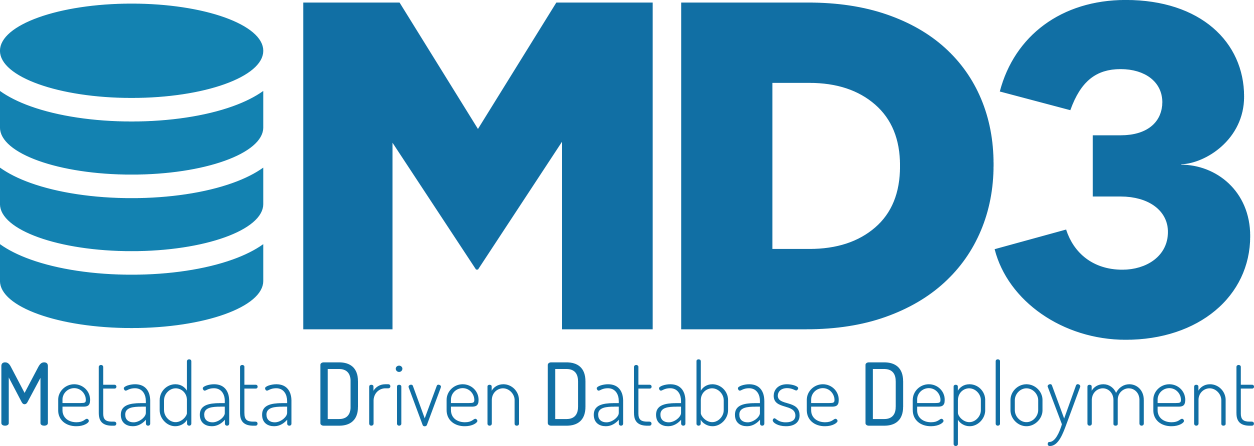Introduction to Metadata Driven Database Deployments

MD3 (Metadata Driven Database Deployment) is my build-and-deploy system that I've evolved over the past 15 years. Deploying database code tends to be challenging for most organizations, especially ISVs that may support multiple versions of their software at many customers. MD3 handles this all very elegantly. Over the next few posts I'll cover why I think MD3 is the best choice for your database deployments.
Table of Contents
| Page | Summary |
|---|---|
| [[Introduction to Metadata Driven Database Deployments]] | This page. |
| Why do we need another database deployment tool like MD3? | Covers some scenarios where traditional database deployment tools fail and how MD3 makes hand-crafted DDL a thing of the past. |
| MD3 and "state" | In this post we cover stateful vs stateless database objects. It is the stateful objects (those with "history" that we need to consider) that cause our database deployments grief. We'll cover how MD3 handles this problem. |
| [[MD3 and The Four Rules]] | The Four Rules will ensure you always deploy your stateful database objects correctly. You don't need MD3 to use The Four Rules, but it helps. |
| [[The Other MD3.Create Procedures]] | Covers the other "stateful" database objects and how MD3 handles their deployment. |
| Shows some use cases with primary keys where MD3 can really save you a lot of time and rewrote. We also further demonstrate how The Four Rules work. | |
| [[MD3 Script Idempotency and MD3.CreateColumn]] | We cover the last MD3.Create procedure in this post and cover the one aspect of MD3 scripts that is mandatory...scripts must be idempotent, which is just a fancy way of saying that all scripts must be rerunnable. |
| [[The OO Design Principles of MD3]] | There are certain object-oriented design principles I incorporated into MD3. These principles are what sets MD3 apart from other database deployment tools. |
| [[MD3 Model Data Patterns]] | Model data is the data, usually static, that you deliver with your application. MD3 deploys this data in much the same way as other stateful objects are deployed. We cover how this is done in this post. |
| RunMD3.ps1: The MD3 Executor | RunMD3.ps1 is a short Powershell script that simply executes each .sql file in each subfolder in your deployment folder. In this post I'll cover how it does what it does, and why. |
| [[MD3 Deployments in Action]] | In this post we put everything together and actually show how deployments work with MD3. |
| [[How to Reverse-Engineer Your Database with MD3]] | The hardest part of any new deployment tool is getting your database migrated into the new structure. This is actually easy with MD3. I'll demo how to reverse-engineer AdventureWorks in the MD3 format, which takes about a couple of hours to do. |
| [[Continuous Integration Testing with MD3]] | CI Loops are a definite development best practice. Yet few shops do this with their database code. And if they do CI Loops they may not be doing them correctly. In this post I'll share some secrets to doing really good CI testing with your database code and then I'll show you how to make it really great with MD3. |
| MD3: Why you should care about declarative database deployments | If you still don't see the value of declarative/properties/metadata driven database deployments I'll give you some additonal arguments in this post. |
| [[MD3 Extensibility Stories]] | I've deployed MD3 at numerous employers and clients and it has always been a success. In this post I'll recount some stories about how I saved tons of man-hours refactoring database schemas using MD3. |
| [[What are the benefits of using MD3 over my existing solution?]] | You don't have to use the entirely of MD3 to get some of its benefits. You can pull out just pieces that you feel may help you. This is a summary post that reviews all of benefits of the tool. |
| Quick Links |
|---|
| Download MD3 (with samples) |
| Documentation on CodePlex/git |
| Presentation on MD3 |
| Other Posts about MD3 |
| AdventureWorks2013 reverse-engineered into MD3 (takes 5 mins to do with ANY database) |
You have just read "[[Introduction to Metadata Driven Database Deployments]]" on davewentzel.com. If you found this useful please feel free to subscribe to the RSS feed. 
Dave Wentzel CONTENT
md3 sql server data architecture
